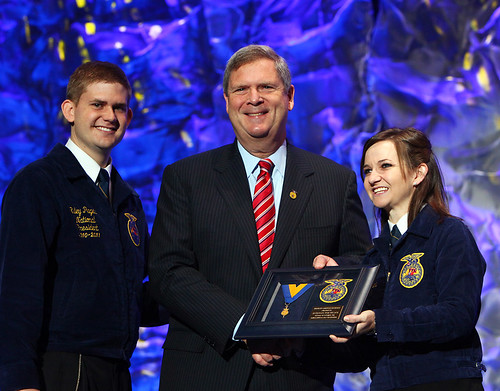
On Oct. 22, Agriculture Secretary Tom Vilsack spoke to the 84th National FFA Convention about the critical need to recruit and support the nation's next generation of farmers and ranchers. In June, I had a chance to sit down with Landan Schaffert, National FFA Secretary, to talk about what the future holds for him in farming.
Question: What interested you in becoming a member of FFA?
Answer: I come from a production agriculture background. I live on a farm in Colorado where we primarily raise corn and cattle. Both my parents were in FFA and I come from a family that has farmed for four generations. I have always had a passion for agriculture. I started in FFA as a freshman in high school. FFA teaches about agriculture, leadership, and making a positive difference in our community and in our country. FFA helps students reach their potential as agriculturalists and leaders. It has taught me the value of maintaining integrity and good character, regardless of who is watching. It also provides me with many skills as a leader, including public speaking and advocating for causes you believe in.
Q: What is the purpose of your visit to USDA?
A: Secretary Vilsack proposed a challenge to the national FFA officer team. He asked for our input, on behalf of youth interested in agriculture, regarding what should be included in the next Farm Bill. Today, we are here to allow FFA members an opportunity to meet in groups and respond to six questions concerning the future of agriculture. Our feedback will be used to compile a report for Secretary
Q: How are FFA and USDA working together and why is this relationship important?
A: USDA represents the entire agricultural industry. FFA is the leadership component of agricultural education that allows students to use the knowledge and skills they gain in the classroom and those skills they develop through hands-on experiences. FFA members use their experiences to develop relationships as they become leaders in the agricultural industry; so I see it as a partnership between representation and education. USDA represents, FFA educates.
Q: What are your future career goals?
A: I have a lot of goals in my future. My first goal is to go into politics. I am very passionate about representing the common person. I believe that we should have a voice of common sense in Washington and even at the state level. It is my goal to start off at the local level and hopefully work my way up through the political system in order to best represent constituents in different parts of the nation. But, I’m also very passionate about helping people and I’d like to do that through inspirational speaking. I am legally blind and this year I’ve had the opportunity to talk to a lot of members on overcoming challenges. Nothing gives me more fulfillment than going on stage, giving a speech, and talking to members about overcoming challenges. It is especially fulfilling when members come up to me after I speak and share the challenges that they are having in their lives. I enjoy being real with them and letting them know there is no goal to large or too difficult to achieve as long as we believe in ourselves. Additionally, I would like to get back into doing production agriculture at some point. My family has a farm in Eastern Colorado. I come from a background rooted deep in the heritage of agriculture. I’d like to continue that tradition as the next generation in our family on our farm working in agriculture. So politics, inspirational speaking, and becoming an agriculturalist are my long-term goals.
Q: What do you consider to be the greatest challenges facing farming in the future?
A: It’s been predicted that by the year 2050 we will have a population in the world of 9 billion people. That is obviously going to require more housing and a reduction in usable acreage to grow crops. However, at the same time we are going to need to produce more food to feed a larger population. I think that is something that Secretary Vilsack has a really good understanding of. We have to start thinking today how we are going to use science, business, technology, and the leaders in each of those different realms to come together and determine ways to grow more food on less acreage so everyone is fed.
